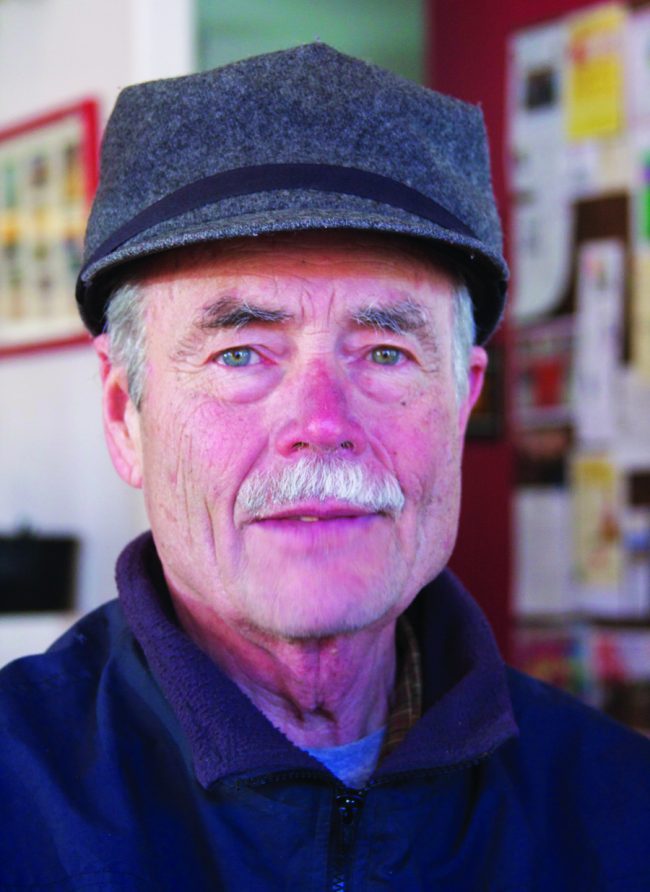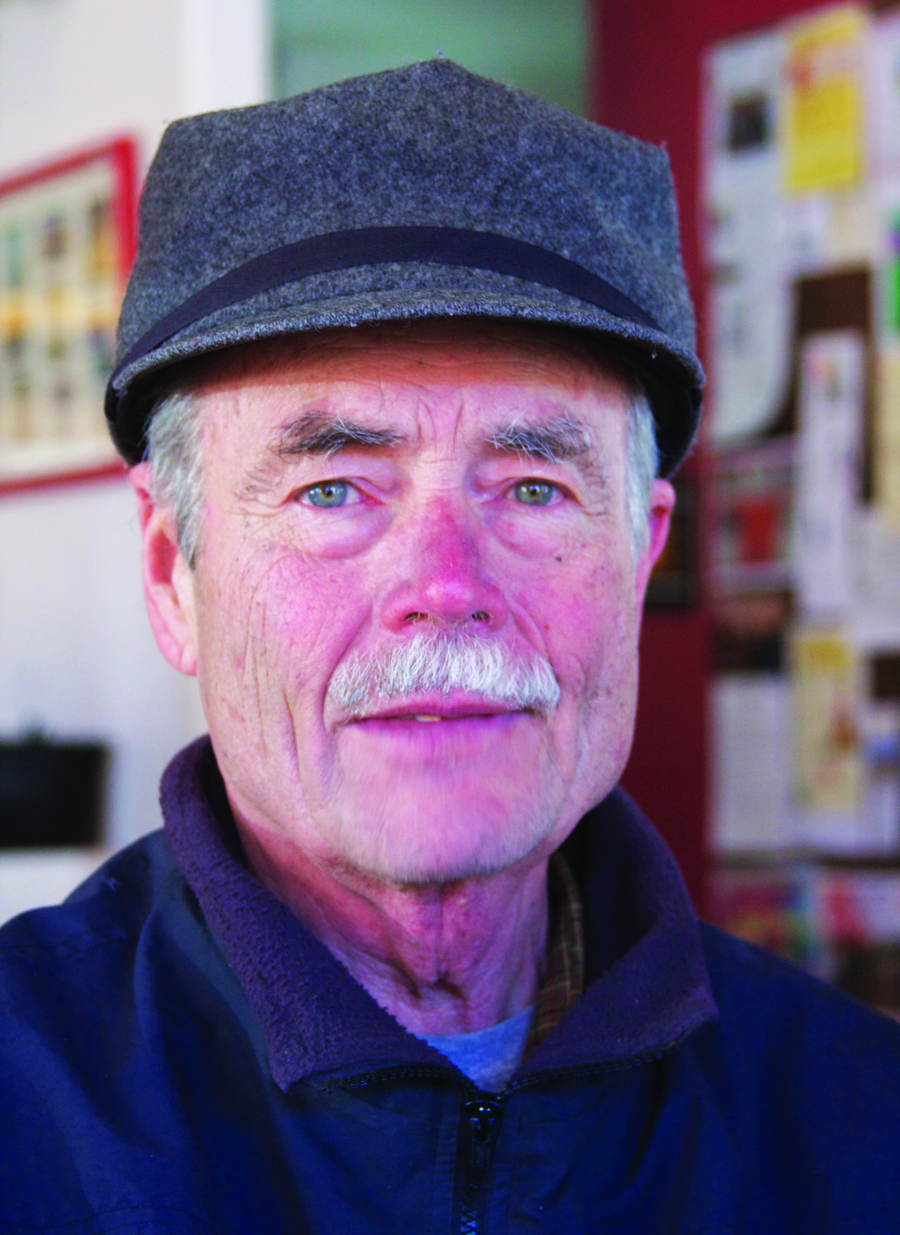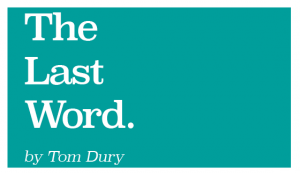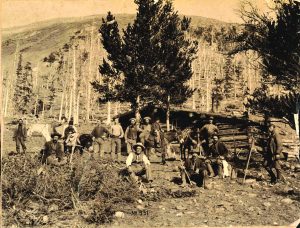
I FIRST MET FORREST Whitman at a Heart of the Rockies Wedding Association vendor show in 2011. I attended in support of a few of my friends who were modeling wedding dresses at the Salida SteamPlant event. To attend, I had to make up a wedding date on the spot. I chose a random, even-numbered summer date two years out. (I was single at the time.)
Forrest was there as an officiant, a job he’d held for many years. We hit it off immediately. He was asking about my fiancé and I admitted that I did not have one, but if he could help find me one, he could be my officiant. I found Forrest to be funny, charming and very real. I enjoyed trying to shock him, he got flustered but never put off. My favorite. None of those things have changed over the years of our friendship. After I bought Colorado Central, my relationship with Forrest grew a new branch, as Forrest continues to write for the magazine. He’s routinely the first one to turn in his piece every month.
In May I attended a Wine and Woo event with the “accidental psychic,” Willow Bradner. She told me I need to write more profiles. I attempted one for the June edition but canceled it out of concern for my subject. This town isn’t as “Pleasantville” as it appears. So, this month I’m giving it a go with Forrest. I realized that, while I know Forrest, I don’t know his background. I just know he’s one heck of a good storyteller. And of course everyone knows he loves trains.
With a long, full, fascinating life like Forrest’s, it’s hard to know where to start. But Forrest knew: “Let’s start where I started doing things interesting.”
To Forrest, this meant starting in 1968, when he “finally managed” (after 8 years) to get his doctorate in ministry from the University of Chicago and Meadville Lombard Theological School. “I learned how to best minister to our fellow humans. Ha! Good luck. My thesis was on the New England transcendentalists.”
While attending three separate universities, Forrest was also always working on the railroad. He worked on the four different railroads that branched from Chicago, his hometown. He got started on the railroads because many of his family members were railroad workers. “If you wanted your degree, work for (the railroad) and work very little — maybe a day or two a week — and yet, still keep working toward your lifetime goals.”
Forrest held every rail job possible: switchman, brakeman, yard clerk and once in a while he even got to be the conductor. It was all freight work, he clarified, but once or twice he worked on a passenger rail. “I was mainly a railroad worker who dabbled in writing and getting degrees.”
The part Forrest liked best was being “in the old caboose, moving out across the prairie. Two days in the old caboose would be a lot of fun for me.”
Forrest was also “very involved in peace groups” and helping those in need. Two things that remained a constant theme throughout his life.
“The railroad thing and the academic thing all came together. I liked working for churches. The more liberal the better, as far as I was concerned. This put us into conflict, I’ll tell you what. We were trying to stop the war machine that was grinding along and grinding up our people — turning them into cannon fodder.”
Forrest said he always had three things going: academia, ministry and the railroad. He called them his themes.
He got ordained three times, all by “very liberal to radical denominations.”
Forrest found Colorado via, you guessed it, the railroad.
“I followed the trains. The first time I got off a train in Denver I said, ‘This is where I want to live. I like Chicago, but I’m not going back.’”
Forrest admitted he did of course return to Chicago for visits, but never to live.
With all this love for his themes, he also loves to read. “Right now I’m reading Lousie Penny, a mystery writer. She’s very good. If I could, I would read, read, read.”
About four years ago Forrest was diagnosed with Parkinson’s Disease.
“Oh it’s terrible. It’s just terrible. I can’t drive a car anymore. That’s huge.” While friends have been wonderful at driving him around, Forrest said he doesn’t like relying on others and that, sometimes, he misses events. “I can’t be as politically active as I once was. That’s a problem. But of course now we’re going through this new period where no one understands what’s going on and what’s pushing all this hate — no one seems to know.”
Forrest said working on the railroad “radically changed” him. Railroad work gave him the financial freedom to pursue his academia, it also physically brought him to Colorado in 1972, where his undying love for railroads provided lifelong friendships and eventually a KHEN radio show called “On the Rails.”
“I loved my KHEN rail show, such fun. We had a little group, and we went around riding trains and talking about the trains we’d ridden. Lots of fun.”
Forrest confessed to me his Parkinson’s makes it increasingly hard for him to have consistent conversations, thus the radio show had to cease. Another tough blow for someone who proclaims his favorite aspect of trains is conversation. “Long conversations into the night with people — long after the bar car was closed and we had to put our second or third drink under the seat. Sitting around talking about what life was really like for people. How do you deal with the failures? Have we all had failures? Oh, I tell you what. We all have.”
My last question to Forrest: if you could have one wish, what would it be? “One wish? I want to say this without sounding trite. Of course you want to say ‘peace on Earth.’ But, I want an educated populace so they could feel powerful. The people out here blowing things up, they are feeling powerless. No real ability to make it a better world.”
Classic Forrest, forever ministering and hoping for peace. Next time you see Forrest around town, strike up a conversation. It will likely be meandering and wonderful. ?
Talking to Forrest always improves Cailey’s mood. His positivity is infectious.
This is sponsored by Ann and Henry Klaiman.



